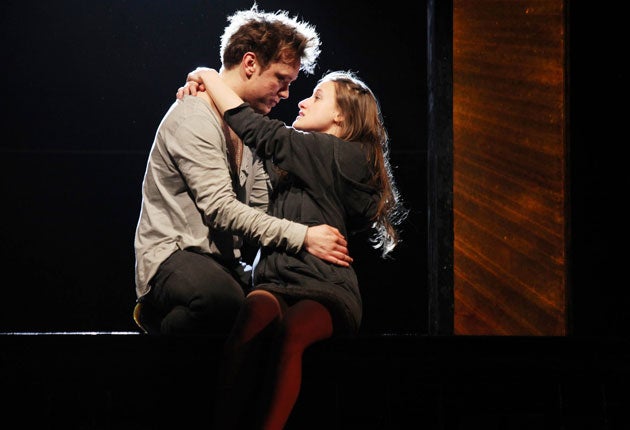Romeo and Juliet, Courtyard, Stratford-upon-Avon
Smoke, fire and street fights

Your support helps us to tell the story
From reproductive rights to climate change to Big Tech, The Independent is on the ground when the story is developing. Whether it's investigating the financials of Elon Musk's pro-Trump PAC or producing our latest documentary, 'The A Word', which shines a light on the American women fighting for reproductive rights, we know how important it is to parse out the facts from the messaging.
At such a critical moment in US history, we need reporters on the ground. Your donation allows us to keep sending journalists to speak to both sides of the story.
The Independent is trusted by Americans across the entire political spectrum. And unlike many other quality news outlets, we choose not to lock Americans out of our reporting and analysis with paywalls. We believe quality journalism should be available to everyone, paid for by those who can afford it.
Your support makes all the difference.Romeo wanders on wearing a parka, jeans and earphones, snapping the girls in the audience, as if a tourist in his own story. Rupert Goold's exciting, headlong production then skips the first 40 lines (the prologue is spoken as a voiceover) and erupts in smoke, fire and a thrilling street fight.
It's not unusual these days to see mixed-up period Shakespeare – ruffs and hoodies, hose and bovver boots – but Goold makes the overlap especially effective as his young lovers start outside their own history and are fully merged in death, leaving family and friends in a modern-dress void.
Perhaps Sam Troughton, a hooker or brawny stand-off on the rugby field, and quirky Mariah Gale (David Tennant's Ophelia), are odd casting. But they are fresh and sexy, struck by a thunderbolt of love, mediated by the exceptional, wheedling Friar Laurence of Forbes Masson.
Gale is brilliant at the adolescent sulkiness of Juliet, corseted into silken finery for her wedding eve, where the ghost of her cousin Tybalt (Joseph Arkley) lays her down and Paris (a stolid James Howard) is undone by her serene beauty in death. Troughton plays with open-eyed wonder at his good fortune. He speaks the verse roughly but intelligently. It is rare to feel the lovers really have fulfilled their destiny, but the world might not have been good enough to contain these two. They are united ecstatically deep into the play's third act, where the interval falls after almost two hours.
Tom Scutt's design is one of the best, using a central platform as domestic table and tomb; hanging braziers for the golden Capulet ball (the masked cast clapping and stomping to Adam Cork's Moroccan-flavoured music); and a stairway up to the balcony and down to the mausoleum, cunningly lit by Howard Harrison.
The fights, by Terry King, are tremendous and the dangerous street-fighting mood is personified in Jonjo O'Neill's extraordinary blond Mercutio, a man brimming with so many insults and words that he must enact them and so eaten with warped sexual fantasy that he climbs inside an imaginary womb and drowns. He daubs his nose red in his own blood, exiting on a clownish grin. We really miss him.
His bullying of Noma Dumezweni's pipe-smoking Nurse is horrid but it is topped by Richard Katz's shocking outburst against his daughter, Juliet, made worse by a callous under-cutting delivery which alternates with fruit-spitting, face-slapping rage.
The last words are now spoken by Balthasar, whom Gruffudd Glyn transforms into a chillingly impassive observer with a fine falsetto singing voice. Juliet stabs herself with some plausibly nightmarish screaming, which melds into the police sirens outside, and the sorry spectacle is jotted down in a notebook by a plain clothes constable. An outstanding evening.
Join our commenting forum
Join thought-provoking conversations, follow other Independent readers and see their replies
Comments